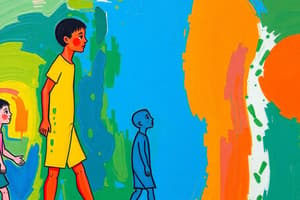Podcast
Questions and Answers
What stage is described by a child developing a 'test phobia' due to high parental demands?
What stage is described by a child developing a 'test phobia' due to high parental demands?
Latency (Industry vs Inferiority)
In which stage might an individual become dependent on drugs due to fear of growing up?
In which stage might an individual become dependent on drugs due to fear of growing up?
Puberty-Adolescence (Identity vs Role Confusion)
What stage involves an individual learning that the world is a trustworthy place due to their needs being lovingly satisfied?
What stage involves an individual learning that the world is a trustworthy place due to their needs being lovingly satisfied?
Oral-Sensory (Trust vs Mistrust)
Which stage is characterized by an individual wishing they could start life over while reflecting on missed opportunities?
Which stage is characterized by an individual wishing they could start life over while reflecting on missed opportunities?
What stage represents an individual discovering who they are and finding genuine love?
What stage represents an individual discovering who they are and finding genuine love?
In which stage does an individual fear to explore their world due to anticipated disapproval from their parents?
In which stage does an individual fear to explore their world due to anticipated disapproval from their parents?
What stage describes an individual saving for their child's college tuition during their peak earning years?
What stage describes an individual saving for their child's college tuition during their peak earning years?
Which stage involves a lack of self-awareness due to limited parental attention in a struggling family?
Which stage involves a lack of self-awareness due to limited parental attention in a struggling family?
Flashcards are hidden until you start studying
Study Notes
Psychosocial Development Stages
-
Latency (Industry vs. Inferiority)
- Child struggles with "test phobia" due to high parental academic expectations.
- Fear of public speaking and participation in class due to concerns about judgment from teachers.
-
Puberty-Adolescence (Identity vs. Role Confusion)
- Individual turns to substance abuse as a coping mechanism for the challenges of maturation.
- Represents confusion and anxiety related to identity formation during adolescence.
-
Oral-Sensory (Trust vs. Mistrust)
- Individual experiences consistent and loving fulfillment of basic needs by parents.
- Develops a fundamental belief that the world is a safe and reliable place.
-
Old Age (Ego Integrity vs. Despair)
- Reflecting on life, individual expresses regret for unfulfilled opportunities and desires a chance to restart.
- Illustrates the emotional struggle of reconciling past experiences with present realities.
-
Young Adulthood (Intimacy vs. Isolation)
- Individual achieves self-awareness and enters a meaningful romantic relationship.
- Represents the journey towards establishing deep, mature connections with others.
-
Locomotor-Genital (Initiative vs. Guilt)
- Individual holds back from exploring independence due to anticipated disapproval from parents.
- Indicates the conflict between the desire for initiative and fear of guilt.
-
Adulthood (Generativity vs. Stagnation)
- Individual, at the peak of career success, prioritizes saving for child's education.
- Reflects active engagement in nurturing the next generation and contributing to society.
-
Muscular-Anal (Autonomy vs. Shame/Doubt)
- Child lacks a robust sense of self due to neglect and minimal parental attention amid poverty.
- Highlights the challenges of developing autonomy and the psychological effects of inadequate support.
Studying That Suits You
Use AI to generate personalized quizzes and flashcards to suit your learning preferences.




